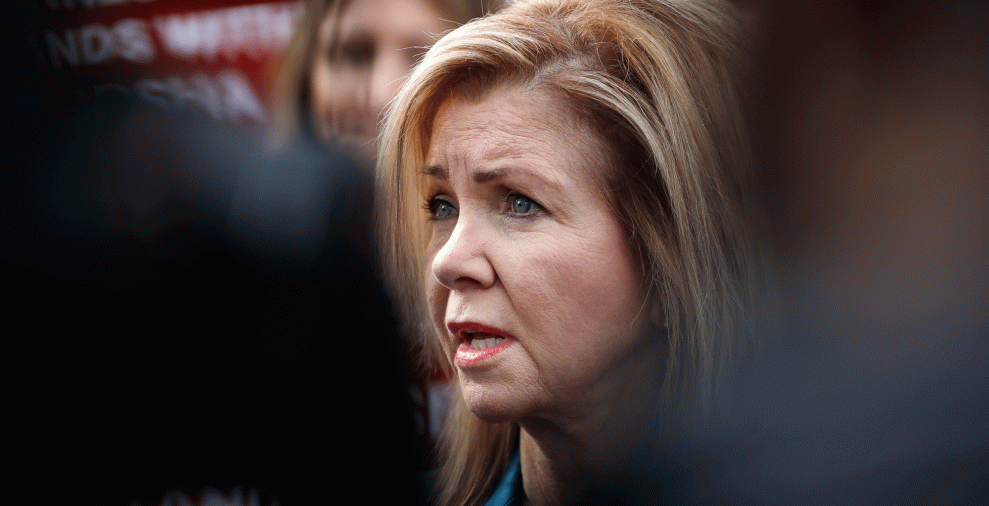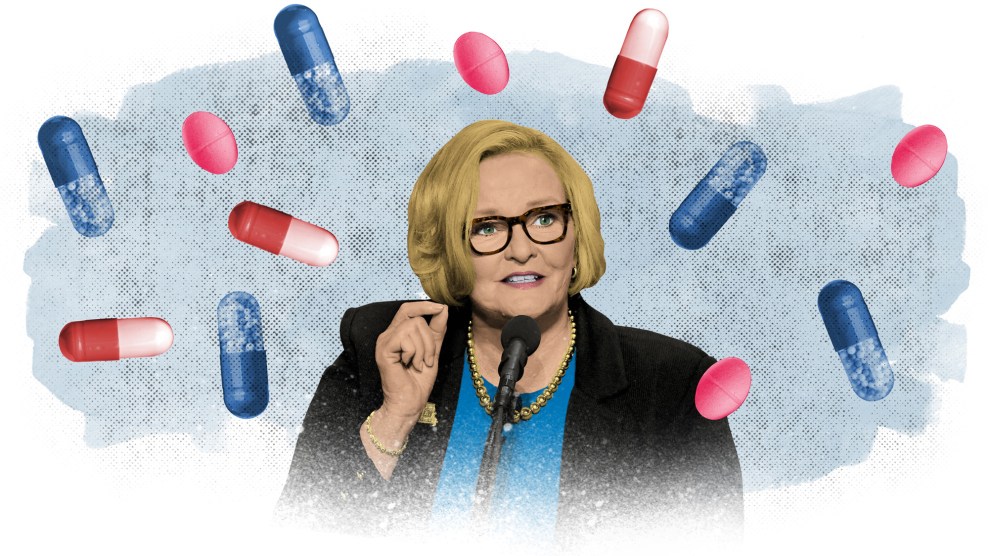
Mark Humphrey/AP
“Every death from opioids is heartbreaking,” said Rep. Marsha Blackburn, the Tennessee Republican running for senate, in an earnest September campaign ad. Looking straight into the camera, Blackburn talked about new funding for treatment and the need to crack down on “drug makers who flood Tennessee with pills.”
In fact, Blackburn has been repeatedly criticized for taking money from the same pharmaceutical makers and distributors she alludes to in her ads—and crafting policy that benefits their bottom lines.
The opioid crisis is personal in Tennessee, which has among the highest overdose rates in the country, and now, the epidemic is playing a prime role in the tough race between Blackburn and former Democratic Gov. Phil Bredesen.
“It’s super popular to talk about” opioids along the campaign trail, said Michele Johnson, director of the Tennessee Justice Center. “There’s a lot of lip service paid.” Tennesseans are looking for more than lip service: Health care topped the list of priorities for likely voters, according to a recent CNN poll. “When Tennesseans say they care about healthcare, one of the things they talk about is the opioid crisis,” said state Democratic Party spokesperson Mark Brown. The epidemic, he went on, “is absolutely the defining issue of this race.”
So what, exactly, is Blackburn’s track record on opioids? Here’s a primer:
Pharma funding
Blackburn has long been among the House’s top recipients of pharmaceutical funding, and the trend has continued during her Senate run: Of all the senate candidates running this year, Blackburn ranks 9th in campaign funding from pharmaceutical or health product PACs and employees, taking in nearly $200,000. The companies make and distribute a variety of drugs, including, but not limited to, opioids. Over the course of her career, Blackburn has received $46,500 from the three pharmaceutical distributors—McKesson, Cardinal Health, and AmerisourceBergen—often accused of flooding small towns across rural America with painkillers.
Muzzling the DEA
Among Blackburn’s signature pieces of legislation is the Ensuring Patient Access and Effective Drug Enforcement Act, a 2016 law that hampers the DEA’s ability to go after companies suspected of illegally distributing opioids. Blackburn maintains that the legislation, which passed with bipartisan support, was intended to ensure that those who needed medications could access them, but critics say that the law played to the interests of the pharmaceutical distributors, which lobbied heavily for its passage. After an investigation by the Washington Post and CBS’ 60 Minutes revealed the law’s shortcomings, Blackburn said that any negative effects on the DEA were “unintended consequences” that she vowed to fix.
Joe Rannazzisi, former head of DEA’s Office of Diversion Control, has a different recollection of the story: In a 2014 conference call with congressional staffers, Rannazzisi warned that the bill would make it far more difficult for the DEA to tackle the opioid crisis, he recently told the Associated Press. “For [Blackburn] to say she didn’t know, or those were unintended consequences, that’s nonsense because I told them what the consequences would be,” he reportedly said.
The legislation has been an issue on the campaign trail. “We were trying to address the problem of the opioid crisis, cracking down on drug companies,” says a now-retired DEA agent in a recent campaign ad for Bredesen. “Congresswoman Blackburn introduced legislation in the middle of this crisis that’s gonna make it more difficult for DEA to do their job. The industry got exactly what they wanted.”
In September, Blackburn co-sponsored legislation that would ease the law, though the new version would still hinder the DEA more than the original, pre-2016 rule. (The bill has yet to move out of committee.)
Calling for—but not funding—treatment
As in much of the United States, access to addiction treatment in Tennessee remains a major barrier: As of 2016, nine out of 10 Tennesseans addicted to illicit drugs didn’t receive treatment.
This spring, Blackburn co-sponsored CARA 2.0, legislation that called for a three-day limit on initial opioid prescriptions and expansion of treatment and overdose response programs. But critics contend that without more funding, such legislation isn’t helpful. “When the rubber meets the road about actually providing funding to solve the problem or to make any changes, it’s far too little, far too late,” said Johnson.
What would be helpful, research suggests, is expanding Medicaid. Tennessee is one of 17 states that opted out of the Obamacare provision greatly expanding the publicly funded health care program for the nation’s poorest residents.
Blackburn has been a vocal opponent of Obamacare and voted to repeal it last year—a measure that, if it had passed, would have led an estimated 3 million Americans with substance use disorders to lose coverage.
Access to addiction treatment—including buprenorphine, the gold standard opioid addiction treatment medication—is substantially higher in states that expanded Medicaid. Expansion also frees up federal grants for longterm recovery: A recent AP analysis on states’ use of emergency opioid funding found that expansion states tended to spend federal grant money on long-term recovery programs, such as job-training and housing, while non-expansion states used the money on treatment basics. “In effect, Medicaid expansion states had a running start on the opioid crisis, while states without the extra Medicaid funding hastened to catch up,” it concluded.
Another key effect of not expanding Medicaid, particularly in rural swaths of Tennessee, is the shuttering of hospitals. Faced with uninsured patients and unable to turn them away in emergency situations, hospitals in non-expansion states frequently go uncompensated for their care. It’s a financial hardship that can, over time, force them to close their doors. When they disappear, so too does a primary source of addiction treatment.
“The hospital closures are bad both because people wont have jobs, so you’re gutting rural Tennessee, but also because then there’s no place for folks to get [addiction] treatment,” said Johnson. “If they have an emergency, getting to the next hospital could be hundreds of miles away.”
Blackburn’s office declined to comment to Mother Jones.













